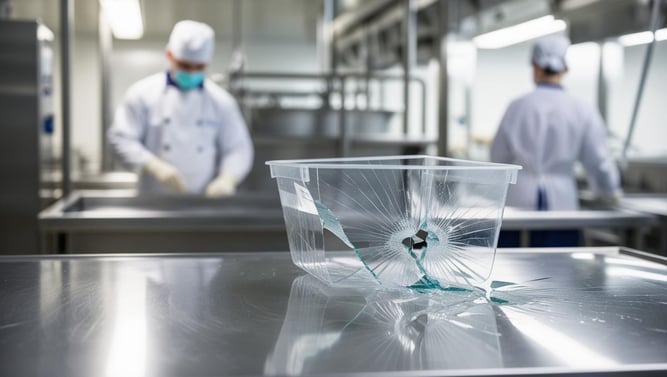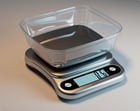
Plastic contamination is a significant concern in the food industry, potentially incurring costs and production delays to maintain customer safety. Ensuring the integrity of plastic equipment can be challenging but is a must for food producers.
Understanding and Preventing Degradation
Sunlight Exposure: UV radiation degrades plastic structures, causing them to become weak and brittle over time (photodegradation). Maximize the lifespan of your plastics by storing them away from direct sunlight where possible.
Temperature Extremes: Plastics turn brittle at a particular temperature known as the ductile-to-brittle transition temperature (DBTT). Obtain data sheets to verify the DBTT of your plastics, and avoid storage in extreme temperatures where possible.
Improving Detection and Accountability

Document the weights of what you use: While not a definitive solution, maintaining a record of the expected weight of empty tubs, or lids, can provide a quick indicator if pieces are missing after breakage so production should not be resumed.
Optimizing Storage Solutions
Food Safety Considerations: If containers come into direct contact with food, they must be food-safe. These will have a wine glass and fork symbol, and/or data sheets will verify food contact is acceptable.
However, for storing non-food items, consider using more durable options. Wham Bam storage boxes are an example of a durable alternative for non-food contact storage.
Leveraging NotaZone for Enhanced Tracking
Daily Contamination Checks: Implement recurring Task Lists in NotaZone to document daily checks of your plastic equipment before production. This allows for easy record-keeping and review of inspection results in the Task Records Overview.
Plastic Breakage Records: Utilise Ad-hoc Task Lists in NotaZone to log plastic breakage incidents. These tasks can be scheduled as needed from a tablet and include options to:
 + Capture photos of the damaged item and recovered pieces.
+ Capture photos of the damaged item and recovered pieces.
+ Record the total weight of the collected fragments.
+ Over 20 different Task Types can be utilised to capture any inspection or incident.
By proactively reducing plastic breakages and efficiently tracking inspections and incidents through systems like NotaZone, you can save time, reduce costs, minimize stress, and even contribute to more sustainable practices.
To learn more about NotaZone Task Lists or to enhance compliance in your food business, schedule a demo.